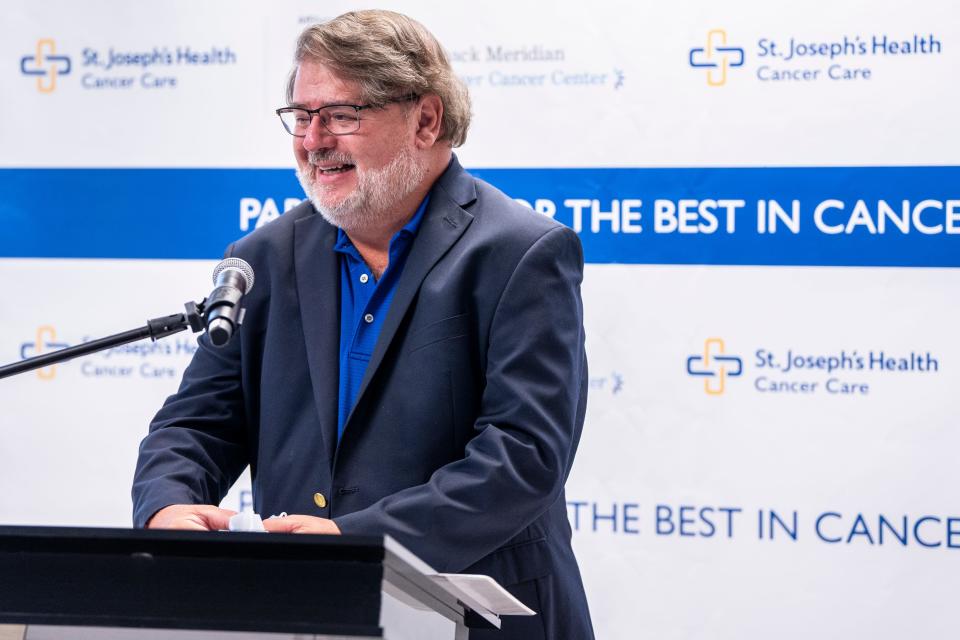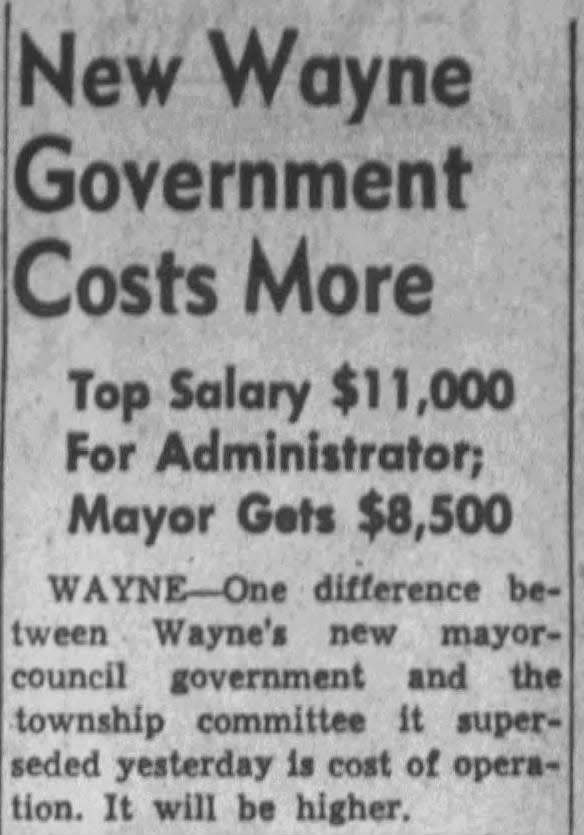Fair raise, or 'golden parachute'? Wayne mayor could get full-time salary of $140K
WAYNE — The mayor is in line to receive a six-figure salary and health care benefits under a historic and controversial change to the municipal code that the Township Council will vote on this month.
The amended ordinance, introduced by the council at its reorganization meeting on Wednesday, would effectively turn the mayor into a full-time employee with a salary of $140,000 per year.
It is a considerable adjustment.
Mayor Christopher Vergano, 63, now serves in the position on a part-time basis and makes an annual wage of $18,750, without benefits.
But Vergano, a Republican who just entered the second year of his fourth term, said his responsibilities are far different from what they were when he assumed the office in January 2008.
“We have an $87 million corporation and a part-time CEO,” Vergano said. “The town deserves better than that.”
LAND USE:In reversal after lawsuit, Wayne zoning board OKs Turkish nonprofit's school dormitory
Vergano, who is still employed as the vice president of sales at Lincoln Park-based Hishi Plastics U.S.A. Inc., said he has several ideas for how to expand his role. Among his priorities, he said, would be a “major push” to explore redevelopment opportunities and to help write more grant applications.
Vergano also said a full-time position would be more convenient for those who want to sit down with him during daylight hours, rather than at night. And if there was anything to be learned by the pandemic, he said, it is that officials need to react instantly to emergencies.
However, the proposed ordinance fueled some critics to launch an online petition to place a referendum on the mayor’s pay hike on the next ballot. The council, meanwhile, voted 6-3 to pass the measure on its first reading. A public hearing and final vote are slated for Jan. 18.
Council members Francine Ritter, Al Sadowski and Joseph Scuralli were against the proposal.
Even Vergano’s staunchest allies had reservations, and members of a finance subcommittee of the council will meet in the coming days to hash over their unsettled questions.
Some asked, for example, how the mayor’s expanded role would affect the day-to-day responsibilities of Business Administrator Christopher Tietjen.

Ritter, of the 5th Ward, has been critical of Vergano’s handling of affordable housing, but at the meeting she commended the way he dealt with the pandemic and his effort to bolster the ranks of the Fire Department and the First Aid Squad.
Those achievements were done on a part-time schedule, she noted.
Furthermore, Ritter said, the mayor knew full well when he ran for reelection that the position was a part-time one. “I don’t see this as something that’s necessary for the Wayne taxpayer to bear,” she said.
Councilman David Varano was highly flattering of Vergano’s actions, saying the township has been getting an “absolute bargain” from his service as mayor.
While he was in favor of the concept of a full-time mayor, Varano said he was not yet fully comfortable with implementing the change. “How we get there is where I’m currently stuck,” he said. “As they say, the devil is always in the details.”
There has never been a full-time mayor in the township — not one in the more than six decades since voters first selected who fills that position.

The township’s first mayor chosen by the people was Richard Browne, whose election in November 1961 coincided with a monumental change in the form of government. He was paid $8,500 in his initial year of duty, according to a newspaper article published at the time.
Before the change, Wayne had a five-member township committee in which members appointed the mayor. The new setup created an elected mayor and a nine-member council, divided into three at-large positions and six from separate wards.
Under that arrangement, which was possible because of a state law known as the Faulkner Act, the mayor became vested with broad powers — including the authority to appoint department heads. And though it is exceptionally rare, he or she can veto an ordinance adopted by the council.
Many of the state’s highest-paid mayors work in large municipalities that also follow the Faulkner Act.
In June, officials in Paterson — the third-most-populous city in New Jersey — approved a $21,000 pay hike for Mayor Andre Sayegh. He did not accept the raise and still receives an annual salary of $119,000.
The proposed ordinance in Wayne drew harsh responses from residents, including Michael Gottesman, of Independence Avenue, who suggested that Vergano timed the salary increase to pad his pension payouts.
“As popular as you are,” Gottesman said, “this is the township of Wayne — not Enron, not JPMorgan Chase, not Amazon or Tesla. And we, the taxpayers, can’t afford a golden parachute.”
Philip DeVencentis is a local reporter for NorthJersey.com. For unlimited access to the most important news from your local community, please subscribe or activate your digital account today.
Email: devencentis@northjersey.com
This article originally appeared on NorthJersey.com: Wayne council weighs full-time salary of $140K for longtime mayor

